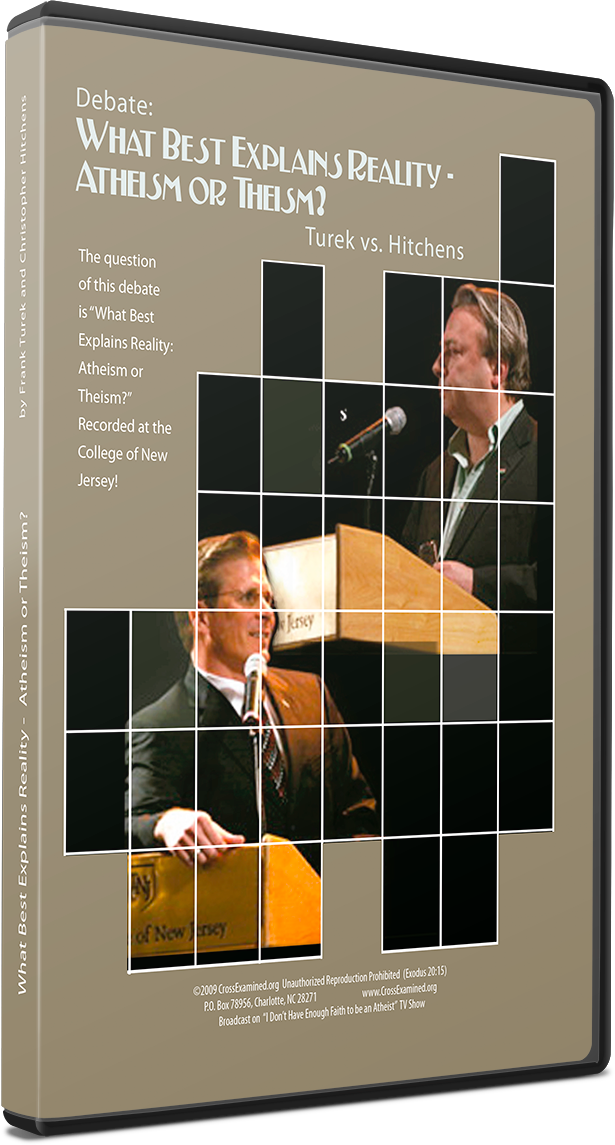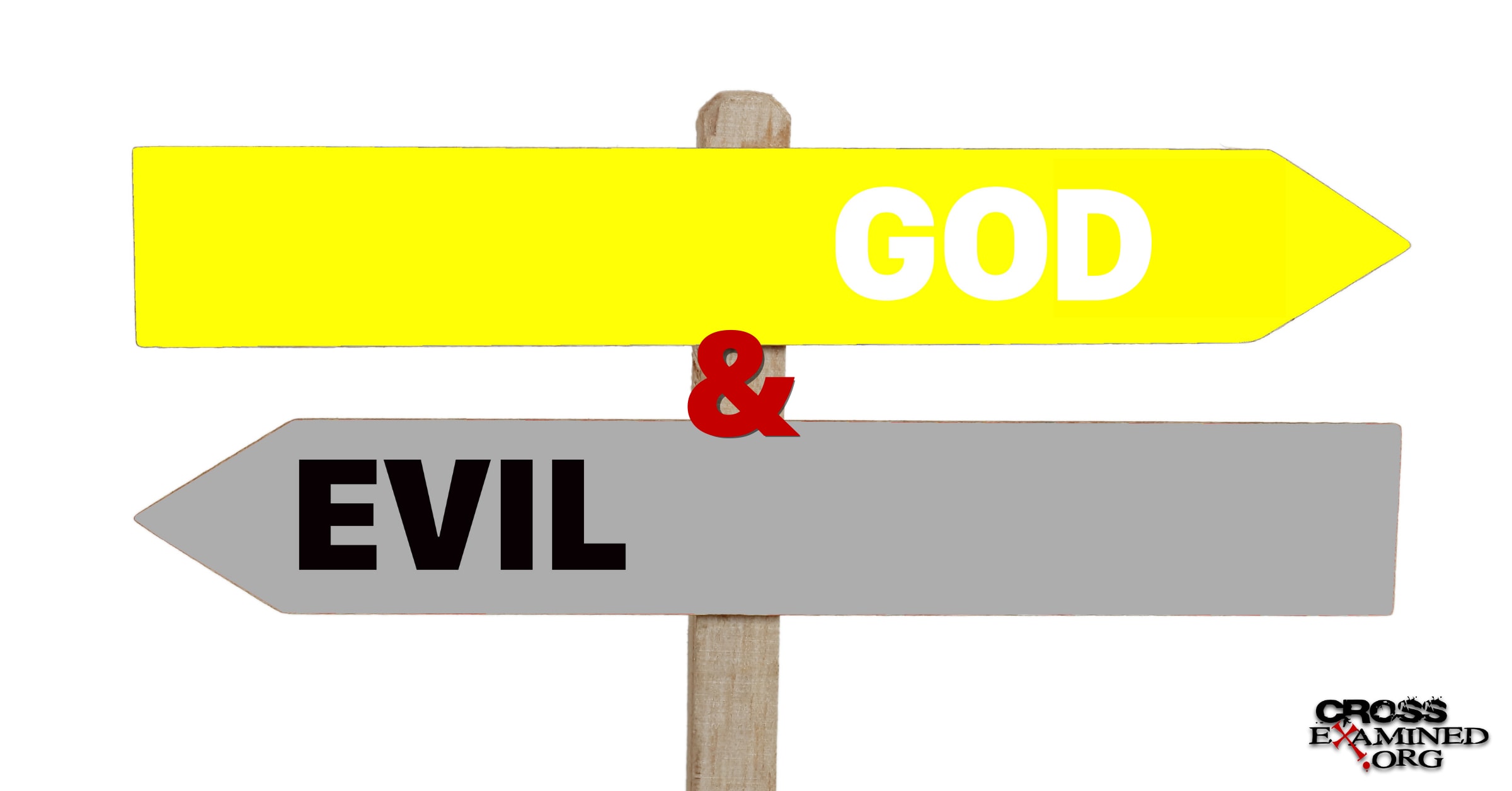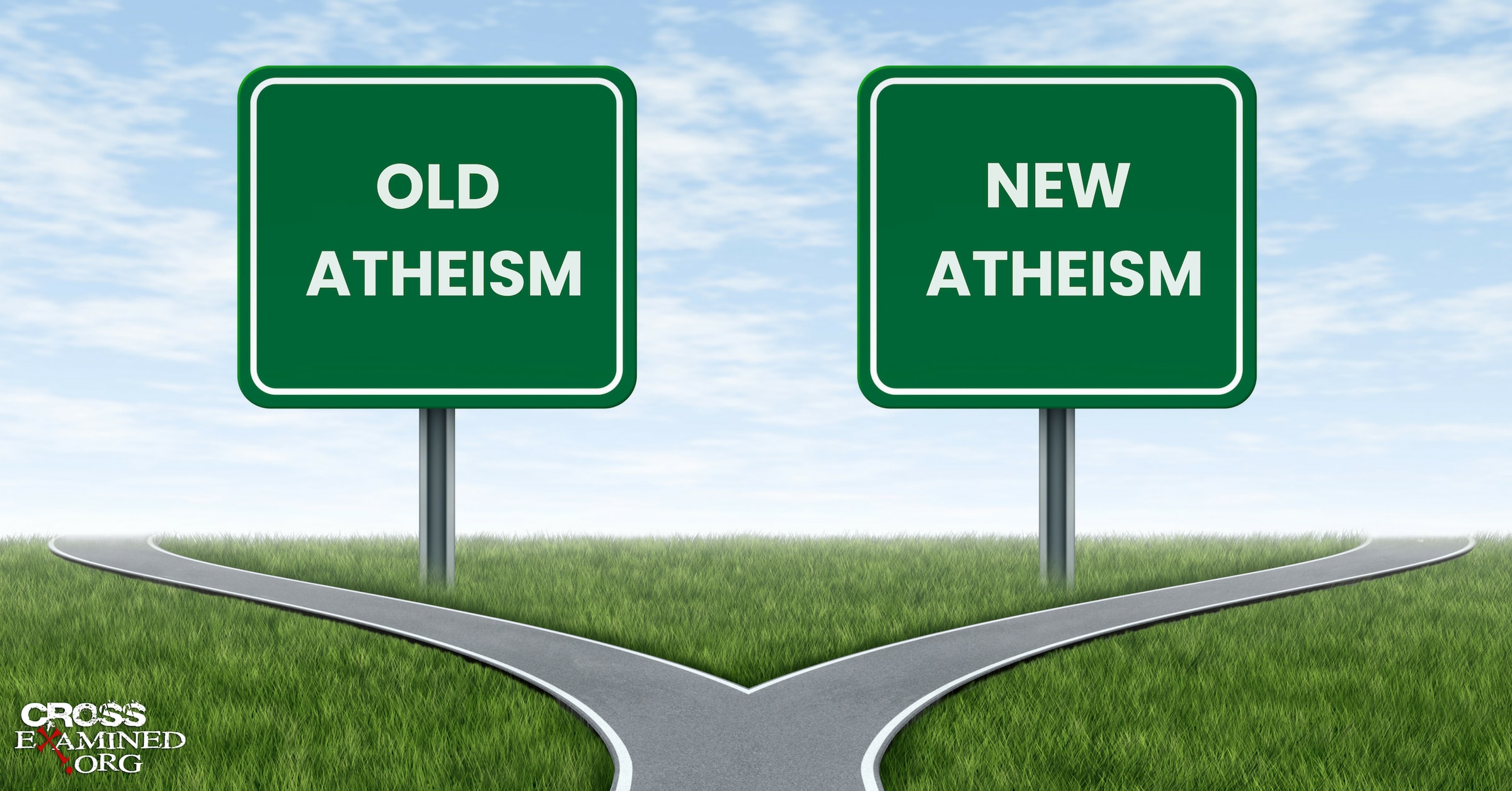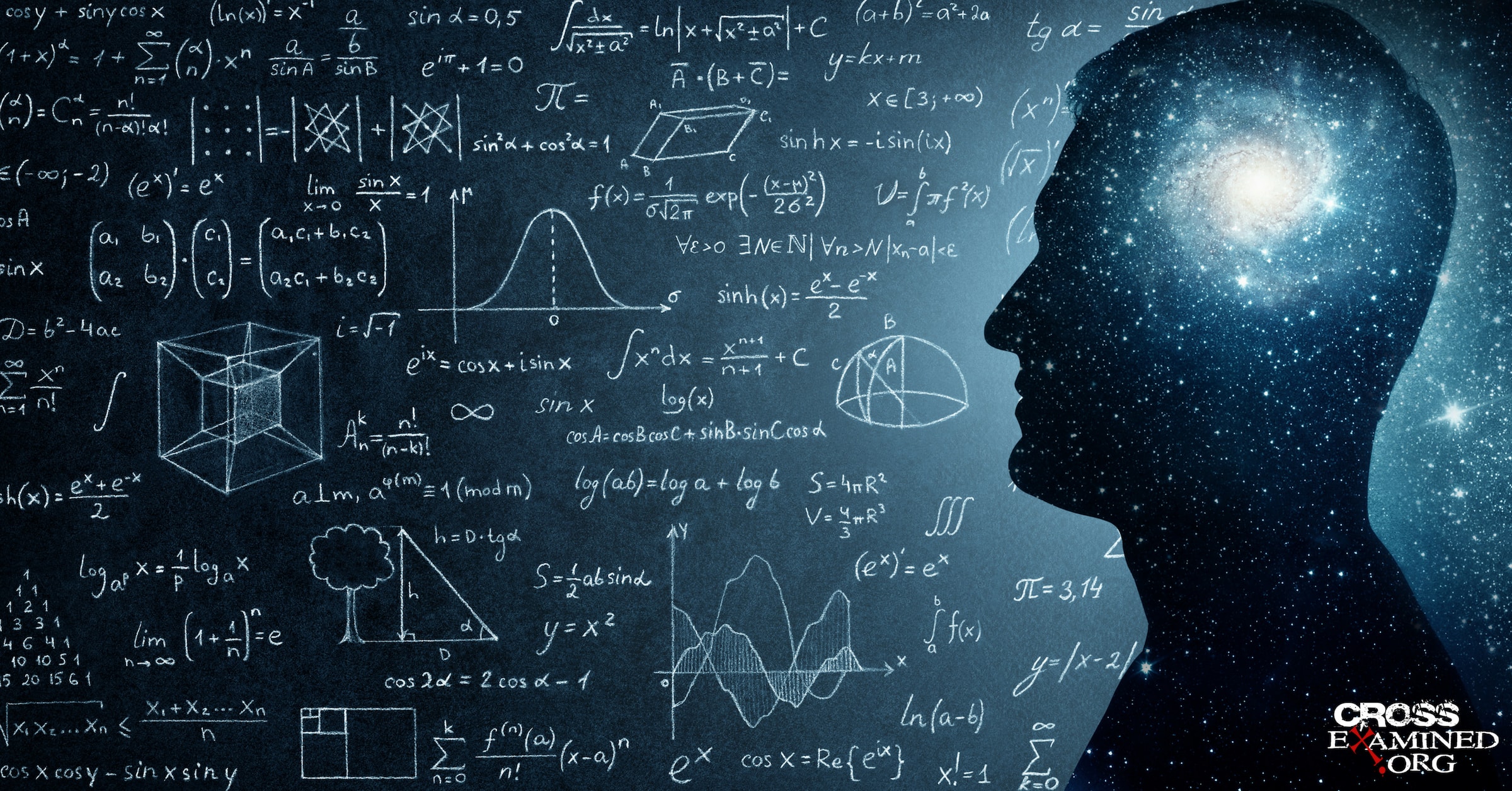By J. Brian Huffling
Introduction
Ever since humans have walked the earth, they have been plagued with many and various questions. Perhaps the most vexing question one can ask is, “How did we get here?” The question of origins, both of the universe and of life on Earth, is a question of great importance. Areas such as philosophy and theology seek to answer this question. The theistic religions, viz., Judaism, Christianity, and Islam, teach that an infinite, all-powerful, all-knowing, all-good, immaterial, eternal being created the universe and life on this planet. This being is commonly called ‘God.’ The position that such a being exists is called ‘theism.’ Theism is an old position that has had many adherents. The denial of theism is called ‘atheism.’ Atheism (as the alpha privative suggests) is the denial of theism. In other words, atheism denies the existence of such a theistic being. [1]
Theism has been argued for on two fronts: reason (philosophy) and revelation (sacred Scriptures, such as the Bible). In terms of the former, arguments are proffered to demonstrate the existence of God. [2] In arguing against God, atheists historically have attempted to disprove his existence at least in part by showing that theistic arguments fail. Thus, atheists have historically interacted with the claims of theists and have attempted to show that theism is logically untenable. However, the last few years has seen a different type of atheism. This new type of atheism, dubbed ‘the new atheism,’ is very different from the traditional form of atheism. In what remains, the author shall explicate the differences of the traditional, or ‘old atheism,’ and the new atheism. This is not an attempt to disprove either type of atheism, just to understand the differences between the two.
A Sketch of the New Atheism
The old atheism is based on logic, argumentation, counter-examples, and is primarily aimed at scholars. The new atheism is the opposite of this. Rather than being based on logical argumentation, sound reasoning, and dealing with typical theistic arguments, the new atheism is an assault of rhetoric aimed at a popular audience. Some of the more well-known new atheists are Richard Dawkins, Sam Harris, Daniel Dennett, and Christopher Hitchens. These four are known as the Four Horsemen (a play on the biblical four horsemen of the Book of Revelation).
Paul Copan says of the new atheists, “Rather than sticking to rational, carefully reasoned arguments, they have taken off the gloves to launch angry, sarcastic, and sloppily argued attacks.” [3] He adds, “They lob their rhetorical grenades in hopes of creating the (incorrect) impression that belief in God is for intellectual lightweights who believe ridiculous, incoherent doctrines and are opposed to all scientific endeavor and discovery. These objectors are writing books… that tend to be more bluster and emotion than substance.” [4] Elsewhere, Copan gives several earmarks of the new atheism. “First,” he says, “for all their emphasis on cool-headed, scientific rationality, they express themselves not just passionately, but angrily.” [5] Perhaps the best example of such emotivism comes from Richard Dawkins. William Lane Craig calls Dawkins “the enfant terrible” of new atheism. [6] He continues, “His best-selling book The God Delusion has become the literary centerpiece of” the new atheism. [7] In this book Dawkins attempts to demonstrate that the existence of God is false, or, to pull from his title, a delusion. Dawkins is a well-known biologist and staunch supporter of Darwinism. One can see Copan’s first point exemplified in the following excerpt from Dawkins’ book:
“The God of the Old Testament is arguable the most unpleasant character in all fiction: jealous and proud of it; a petty, unjust, unforgiving control-freak; a vindictive, bloodthirsty ethnic cleanser; a misogynistic, homophobic, racist, infanticidal, genocidal, filicidal, pestilential, megalomaniacal, sadomasochistic, capriciously malevolent bully.” [8]
Dawkins’s book is filled with such emotion. Christopher Hitchens is not unlike Dawkins in his appeal to emotion; however, he may be a little more tame. In his book, god is not Great: How Religion Poisons Everything, Hitchens argues, again, as the title suggests, that religion is at the root of many problems. He argues, “As I write these words, and as you read them, people of faith are in their different ways planning your and my destruction, and the destruction of all the hard-won human attainments that I have touched upon. Religion poisons everything.” [9]
The second point that Copan makes regarding the new atheists is that “the Neo-atheists’ arguments against God’s existence are surprisingly flimsy, often resembling the simplistic village atheist far more than the credentialed academician.” [10] An example of this will be given in the next section concerning a traditional theistic argument and how the new atheists’ method compares with traditional atheism. In commenting on this type of reasoning that Copan addresses, William Lane Craig states:
“Several years ago my atheist colleague Quentin Smith unceremoniously crowned Stephen Hawking’s argument against God in A Brief History of Time as ‘the worst atheistic argument in the history of Western thought.’ [11] With the advent of The God Delusion the time has come to relieve Hawking of this weighty crown and to recognize Richard Dawkins’s accession to the throne.” [12]
“Third,” Copan continues, “the New Atheists aren’t willing to own up to atrocities committed in the name of atheism by Stalin, Pol Pot, or Mao Zedong, yet they expect Christians to own up to all barbarous acts performed in Jesus’s name.” [13] Indeed, new atheists such as Hitchens and Dawkins do believe that religion is a source of inhumane acts. For example, both Hitchens and Dawkins deplore a morality that is based on the Bible or any type of religious dogma and do blame religion for many of the world’s atrocities. [14] Dawkins does discuss Hitler and Staling being atheists. He says that two points are normally brought up to him: “(1) [not only] were Stalin and Hitler atheists, but (2) they did their terrible deeds because they were atheists.” [15] However, Dawkins rejects the idea that their atheism caused their horrible deeds. He argues, “Assumption (1) is irrelevant anyway because assumption (2) is false. It is certainly illogical if it is thought to follow from (1).” [16] He thus denies that “atheism systematically influences people to do bad things,” whereas he believes that religion does. [17]
Thus, Copan has presented a few of the earmarks of the new atheism. In order to contrast the new atheism with traditional atheism, the author shall present a traditional theistic proof and give the evaluations of both types of atheism. The argument that is presented is a type of cosmological argument, viz., Thomas Aquinas’ second way.
The Cosmological Argument: A Test Case
There are many theistic arguments. One of the most popular, and perhaps the most powerful, is the cosmological argument. The cosmological argument takes many forms. The one presented here is the second of Thomas Aquinas’ famous Five Ways. It states:
“The second way is from the nature of the efficient cause. In the world of sense, we find there is an order of efficient causes. There is no case known (neither is it, indeed, possible) in which a thing is found to be the efficient cause of itself; for so it would be prior to itself, which is impossible. Now in efficient causes, it is not possible to go on to infinity, because in all efficient causes following in order, the first is the cause of the intermediate cause, and the intermediate is the cause of the ultimate cause, whether the intermediate cause be several, or one only. Now to take away the cause is to take away the effect. Therefore, if there be no first cause among efficient causes, there will be no ultimate, nor any intermediate cause. But if in efficient causes it is possible to go on to infinity, there will be no first efficient cause, neither will there be an ultimate effect, nor any intermediate efficient causes; all of which is plainly false. Therefore, it is necessary to admit a first efficient cause, to which everyone gives the name of God.” [18]
It is important in a discussion of the second way for one to be clear about what is meant by ‘efficient causes.’ Maurice R. Holloway gives as a definition of efficient causes “an agent that exercises its influence over the existence of some other being, the effect, through an activity that is properly its own nature, its own form—an activity that is proportioned to the nature of the agent.” [19] To illustrate his point, he explains how efficient causality relates to his writing his book. There are many types of causes involved in its production, but the efficient cause is the man himself. “Thus the first characteristic of a proper [efficient] cause is this: it produces the effect by an activity that is proportioned to its own nature or being.” [20]
With this understanding of efficient causality in mind, what Aquinas is saying in his second way is that nothing can be the efficient cause of itself, because in order for this to happen the effect would have to exist “prior to itself,” which is a contradiction. Further, efficient causes cannot “go on to infinity,” for then there would be no first cause, and if there is no first cause then there is no effect. However, there is an effect. Therefore, it is necessary to posit a first efficient cause, which is understood to be God.
At this point, it will be instructive to explore what traditional atheists have to say about the above argument in contradistinction with what the new atheists say. Michael Martin and J. L. Mackie will represent the traditional atheism, while Christopher Hitchens and Richard Dawkins will represent the new atheism. The agnostic David Berlinski will also have something to say about the argument, especially in light of Dawkins’ comments. This comparison will give the reader some idea of the differences between the two types of atheism.
A Traditional Response to the Second Way
Michael Martin considers the first three of the five ways “sophisticated versions” of more simple cosmological arguments.[21] Martin understands efficient causality in this context to mean “not a prior event but a substantial agent that brings about change.”[22] He further adds that “the priority of a cause need not be temporal; a cause is prior to its effects in the sense that the cause can exist without the effect but not conversely.”[23] Martin thinks it “important to realize that Aquinas’s argument purports to establish a first cause that maintains the universe here and now. His second way is not concerned with establishing a first cause of the universe in the distant past,” which Aquinas did not think could be done from the realm of reason alone.” [24] At this point, Martin gives two illustrations to make the argument more clear. “Consider,” he says, “a series of falling dominos. It is analogous to a temporal causal sequence. Aquinas does not deny on philosophical grounds that infinite sequences of this sort can exist. But now consider a chain in which one link supports the next. There is no temporal sequence here.” [25] This latter example, Martin notes, is analogous to Thomas’ understanding of efficient causality. This is Martin’s explanation and understanding of the second way.
In evaluating the argument, Martin explains that
“the first cause, even if established, need not be God; and Aquinas gives no non-question-begging reason why there could not be a nontemporal infinite regress of causes. This latter is an especially acute problem. Unless some relevant difference is shown between a temporal and a nontemporal infinite series, Aquinas’s claim that an infinite temporal sequence cannot be shown to be impossible by philosophical argument seems indirectly to cast doubt on his claim that philosophical argument can show the impossibility of a nontemporal causal series.” [26]
Thus, Martin explains and evaluates Aquinas’s second way.
J. L. Mackie gives the argument of the second way within the context of the third way. In other words, in examining the third way, he says that Aquinas uses the second way to show that an infinite regress of causes is not possible. After examining the second way to explicate the problem of infinite regresses in terms of efficient causes, he then pronounces the second way unsound. He goes on to say, “Although in a finite ordered series of causes the intermediat… is caused by the first item, this would not be so if there were an infinite series. In an infinite series, every item is caused by an earlier item. The way in which the first item is ‘removed’ if we go from a finite to an infinite series does not entail the removal of the later items.” [27] He then states that “Aquinas… has simply begged the question against an infinite regress of causes. But is this a sheer mistake, or is there some coherent thought behind it?” [28] To illustrate the point, Mackie points out that if one was told about a watch without a spring, adding an infinite number of gears would not help the watch operate correctly. Also, one would not be satisfied to learn of an infinite number of boxcars in a train without an engine. The gears depend on a spring, and the boxcars depend on an engine. Thus, Mackie argues, “There is here an implicit appeal to the following general principle: Where items are ordered by a relation of dependence, the regress must end somewhere; it cannot be either infinite or circular.” [29] For Mackie, “this principle is at least highly plausible; the problem will be to decide when we have such a relation of dependence.” [30] Mackie thus rejects the second way in his overall discussion of the third way.
In summary, Martin and Mackie both interact with and evaluate Aquinas’ second way. Whatever one’s opinion of their conclusions, they at least attempt to present the argument as Aquinas put it and try to allow their readers to feel its force. If one wanted to dismiss their conclusion, he would have to dismiss at least part of their argument. Thus, while one may disagree with Martin and Mackie, they put forth a logical argument as to why they believe the cosmological argument, in this form, to be invalid. They have a philosophical and rational argument against it.
Now that the traditional atheistic responses have been given to the second way it is appropriate to examine what the new atheism has to say.
The New Atheism’s Response to the Second Way
Perhaps the most instructive critique from the new atheism regarding the cosmological arguments for God comes from Richard Dawkins. Before laying out the argument, Dawkins claims, “The five ‘proofs’ asserted by Thomas Aquinas in the thirteenth century don’t prove anything, and are easily—though I hesitate to say so, given his eminence—exposed as vacuous.” [31] After this unflattering introduction, Dawkins gives a very abbreviated synopsis of the first three ways. He lays the argument out in these words: “Nothing is caused by itself. Every effect has a prior cause, and again we are pushed back into regress. This has to be terminated by a first cause, which we call God.” [32] After giving such summaries of the first three ways, Dawkins gives his response. He declares that each of these arguments
“make the entirely unwarranted assumption that God himself is immune to the regress. Even if we allow the dubious luxury of arbitrarily conjuring up a terminator to an infinite regress and giving it a name, simply because we need one, there is absolutely no reason to endow that terminator with any of the properties normally ascribed to God; omnipotence, omniscience, goodness, creativity of design, to say nothing of such human attributes as listening to prayers, forgiving sins and reading innermost thoughts. Incidentally, it has not escaped the notice of logicians that omniscience and omnipotence are mutually incompatible. If God is omniscient, he must already know how he is going to intervene to change the course of history using his omnipotence. But that means he can’t change his mind about his intervention, which means he is not omnipotent.” [33]
Dawkins further rejects the notion that an infinite regress is impossible. He argues “some regresses do reach a natural terminator. Scientists used to wonder what would happen if you could dissect, say, gold into the smallest possible pieces. Why shouldn’t you cut one of those pieces in half and produce an even smaller smidgen of gold?” [34] In fact, this is precisely what Dawkins says happens. According to him, “The regress, in this case, is decisively terminated by the atom. The smallest possible piece of gold is a nucleus consisting of exactly seventy-nine protons and a slightly larger number of neutrons, attended by a swarm of seventy-nine electrons.” [35] Thus, for Dawkins, “The atom provides a natural terminator to [this] type of regress. [Thus,] it is by no means clear that God provides a natural terminator to the regresses of Aquinas.” [36]
In Christopher Hitchens’ book, the fifth chapter is titled, “The Metaphysical Claims of Religion Are False.” Of all the chapters in his book, if one wanted to see how he handles such arguments as the cosmological argument, one should look here. In the opening sentence of this chapter he writes, “I wrote earlier that we would never again have to confront the impressive faith of an Aquinas or a Maimonides… This is for a simple reason. Faith of that sort—the sort that can stand up at least for a while in a confrontation with reason—is now plainly impossible.” [37] “The early fathers of faith,” he says, “were living in a time of abysmal ignorance and fear.” [38] To illustrate this alleged ignorance, Hitchens says that “Aquinas half believed in astrology, and was convinced that the fully formed nucleus… of a human being was contained inside each individual sperm. One can only mourn over the dismal and stupid lectures on sexual continence that we might have been spared if this nonsense had been exposed earlier than it was.” [39] Hitchens goes on to inform, “One must state it plainly. Religion comes from the period of human prehistory where nobody… had the smallest idea what was going on. It comes from the bawling and fearful infancy of our species, and is a babyish attempt to meet our inescapable demand for knowledge.” [40]
In a discussion on William of Occam (Aquinas does not appear again in this chapter), he argues that “even the first cause has its difficulties since a cause will itself need another cause.” [41] This is the closest to an actual metaphysical statement that occurs in the chapter (and the whole book). “Thus,” he asserts, “the postulate of a designer or creator only raises the unanswerable question of who designed the designer or created the creator. Religion and theology… have consistently failed to overcome this objection.” [42] This concludes the metaphysical chapter.
Even the casual reader can tell a vast difference between the traditional atheism and the new atheism in terms of how they handle the above argument. While the traditional atheists have a more cool, logical tone to their evaluation, the new atheists, who want to believe they have an unbiased, scientific position, are drenched in inflamed rhetoric. In the above quote, Dawkins uses words and phrases such as “unwarranted assumption” and “the dubious luxury of arbitrarily conjuring up” a termination to the regress “simply because we need one.” These types of words are designed to appeal to the emotions of the reader. There are times when “unwarranted assumptions” are made; however if one is going to make accusations of this sort, it would be appropriate to know what the assumptions are. Hitchens uses the same type of rhetoric. He talks about the early fathers “living in a time of abysmal ignorance,” about “dismal and stupid lectures,” and that religion originated from people who did not have “the smallest idea what was going on,” and that it came “from the bawling and fearful infancy of our species, and is a babyish attempt to meet our inescapable demand for knowledge.”
Such language is a smoke screen for people who have no logical arguments to offer. It sounds good to people who agree with their conclusions, but it is bankrupt of rational power. As such, this rhetoric is fallacious as it rests solely on emotion. It also commits the ad hominem fallacy as it is an attack on the persons making the arguments and not the arguments themselves. Further, the fact that Hitchens attacks Aquinas for having a particular belief (without a single reference) about biology is a straw man fallacy. Such quotations (which are not few in number) are cannon fodder for even the first-semester logic student.
Further, Dawkins seems unable to stay on track in attacking the second way. Such issues as the nature of the cause, such as omniscience and omnipotence, is a discussion for philosophical theology and is not part of Aquinas’ argument for a cause. Aquinas, here, simply says that the cause must be necessary. A discussion about the nature of the cause, while possibly implied by such arguments, are not germane to a discussion on the necessity of an uncaused cause. Such doctrines are debated among theists. There are theists on both sides of the debate. Thus, the nature of the cause does not negate the existence of the cause.
The new atheists do not offer clear arguments for their case. An argument where premises lead to a conclusion is wholly lacking in their works, at least on the level that they are found in the traditional atheism. Rather than offering logical arguments, they offer rhetoric, fallacious reasoning, and nonsense. David Berlinski, himself an agnostic, says of Aquinas’s argument, “This is a weak but not an absurd argument, and while Aquinas’s conclusion may not be true, objections to his argument are frequently inept. Thus, Richard Dawkins writes that Aquinas ‘makes the entirely unwarranted assumption that God is immune to the regress.’ It is a commonly made criticism.” [43] He adds, “But Aquinas makes no such assumption, and thus none that could be unwarranted. It is the conclusion of his argument that causes in nature cannot form an infinite series. If [he is] prepared to reject this conclusion, Dawkins … must show that the argument on which it depends is either invalid or unsound. This [he has] not done.” [44]
Another hallmark of the new atheism is a complete misrepresentation of the arguments they are trying to attack. The above representation of the second way has been given, and the reader can see that Dawkins does not even attempt to seriously interact with it. He does the same thing with other arguments, and even worse. Aquinas gives his third way as follows:
“The third way is taken from possibility and necessity, and runs thus. We find in nature things that are possible to be and not to be, since they are found to be generated, and to corrupt, and consequently, they are possible to be and not to be. But it is impossible for these always to exist, for that which is possible not to be at some time is not. Therefore, if everything is possible not to be, then at one time there could have been nothing in existence. Now if this were true, even now there would be nothing in existence because that which does not exist only begins to exist by something already existing. Therefore, if at one time nothing was in existence, it would have been impossible for anything to have begun to exist; and thus even now nothing would be in existence—which is absurd. Therefore, not all beings are merely possible, but there must exist something the existence of which is necessary. But every necessary thing either has its necessity caused by another or not. Now it is impossible to go on to infinity in necessary things which have their necessity caused by another, as has been already proved in regard to efficient causes. Therefore, we cannot but postulate the existence of some being having of itself its own necessity, and not receiving it from another, but rather causing in others their necessity. This all men speak of as God.” [45]
However, Dawkins phrases it this way: “There must have been a time when no physical things existed. But, since physical things exist now, there must have been something non-physical to bring them into existence, and that something we call God.” [46] Now, it is one thing to summarize an argument. It is quite another to misrepresent it. Aquinas does not discuss ‘physical things.’ Rather, his argument is metaphysical in nature. Dawkins simply does not understand what he is attempting to refute.
The same is the case for the others as well. The fifth way is probably the most misunderstood. Dawkins, as many do, misunderstand it for a design argument when it, in fact, is an argument from final causality. Here is the argument as Aquinas gives it:
“The fifth way is taken from the governance of the world. We see that things which lack intelligence, such as natural bodies, act for an end, and this is evident from their acting always, or nearly always, in the same way, so as to obtain the best result. Hence it is plain that not fortuitously, but designedly, do they achieve their end. Now whatever lacks intelligence cannot move towards an end, unless it be directed by some being endowed with knowledge and intelligence; as the arrow is shot to its mark by the archer. Therefore, some intelligent being exists by whom all natural things are directed to their end; and this being we call God.” [47]
Of this argument, Dawkins says, “The argument from design is the only one still in regular use today, and it still sounds to many like the ultimate knockdown argument.” [48] However, such is not the case. Rather than being an argument from design it is an argument from final causality. In other words, the argument does not say that since things are designed there must be a designer; rather, it says that such things as animals and “natural bodies” act in accordance with some goal. However, such things can only do so if they are directed. Therefore, some being must exist that directs them. One cannot fault Dawkins too much for this particular blunder since so many others make it as well; however, it is characteristic of the new atheists failure to understand the argument they are responding to and to deal with them fairly.
The point is not simply to show that the new atheists are wrong in their work; rather, the point is to show that they have nothing to contribute to the discussion other than heated rambling.
Before concluding, it will be instructive to give the best “argument” that Richard Dawkins, perhaps the champion of the new atheism, offers. In his book in a chapter titled, “Why There is Almost Certainly No God,” Dawkins offers what he considers to be “the central argument of [his] book.” [49] At the end of the chapter Dawkins gives a six-point summary of the argument. As David Berlinski does in his book, I shall only give the first three points, as they are the main concern.
- One of the Greatest challenges to the human intellect, over the centuries, has been to explain how the complex, improbable appearance of design in the universe arises.
- The natural temptation is to attribute the appearance of design to actual design itself. In the case of a man-made artifact such as a watch, the designer really was an intelligent engineer. It is tempting to apply the same logic to an eye or a wing, a spider or a person.
- The temptation is a false one because the designer hypothesis immediately raises the larger problem of who designed the designer. The whole problem we started out with was the problem of explaining statistical improbability. It is obviously no solution to postulate something even more improbable. We need a ‘crane’, not a ‘skyhook’, for only a crane can do the business of working up gradually and plausibly from simplicity to otherwise improbable complexity. [50]
This is indeed not a logical argument, but more of a probabilistic argument. In fact, it is not really an argument at all. In referring to Dawkins’ argument, Berlinski retorts, “In all this, Dawkins has failed only to explain his reasoning, and I am left with the considerable inconvenience of establishing his argument before rejecting it.” [51]
The main problem with the above points is Dawkins assertion that “the designer hypothesis raises the larger problem of who designed the designer,” and that a designer would be even “more improbable.” Such objections as “who created the creator,” and “who designed the designer” are staples of the new atheism. Dawkins seems to miss the design argument, which states: Everything that has a design needs a designer. The universe is designed. Therefore, the universe needs a designer.
According to the argument which usually takes this form, only designs needs designers; designers do not need designers. [52] Everything does not need a designer, only things that are designed need a designer.
Further, Dawkins asserts that a designer or creator of the universe is even more improbable than the universe itself and would also be complex. However, this is patently false. Berlinski again brings clarity to the argument by saying, “We explain creation by appealing to creators, whether deities or the inflexible laws of nature. We explain what is chancy by appealing to chance. We cannot do both. If God did make the world, it is not improbable. If it is improbable, then God did not make it.” [53] He further notes, “The best we could say is that God made a world that would be improbable had it been produced by chance. But it wasn’t, and so He didn’t. This is a discouraging first step in an argument said to come close to proving that God does not exist.” [54]
Craig believes that Dawkins’ assertion that God would need explaining in the manner of the universe has many flaws. “First, in order to recognize an explanation as the best, one needn’t have an explanation of the explanation. This is an elementary point concerning inference to the best explanation as practiced in the philosophy of science.” [55] The second point concerns the assumption that “the designer is just as complex as the thing to be explained so that no explanatory advance is made.” [56] Here Craig argues that an explanation may be less simple than others but may still be true. However, I believe that there is a more fundamental problem with Dawkins’ point, and again, this is characteristic of the new atheism. Dawkins does not ever explain why it is the case that God would have to be just as complex, or more so, than the universe. In fact, in his own discipline, he teaches, per Darwinian theory, that simple organisms give rise to more complex organisms. [57] However, Dawkins’ assertion is false metaphysically. As Aquinas shows in the first way, the cause of all effects must be simple, i.e., having no parts. The first way argues:
“The first and more manifest way is the argument from motion. It is certain, and evident to our senses, that in the world some things are in motion. Now whatever is in motion is put in motion by another, for nothing can be in motion except it is in potentiality to that towards which it is in motion; whereas a thing moves inasmuch as it is in act. For motion is nothing else than the reduction of something from potentiality to actuality. But nothing can be reduced from potentiality to actuality, except by something in a state of actuality. Thus that which is actually hot, as fire, makes wood, which is potentially hot, to be actually hot, and thereby moves and changes it. Now it is not possible that the same thing should be at once in actuality and potentiality in the same respect, but only in different respects. For what is actually hot cannot simultaneously be potentially hot; but it is simultaneously potentially cold. It is therefore impossible that in the same respect and in the same way a thing should be both mover and moved, i.e. that it should move itself. Therefore, whatever is in motion must be put in motion by another. If that by which it is put in motion be itself put in motion, then this also must needs be put in motion by another, and that by another again. But this cannot go on to infinity, because then there would be no first mover, and, consequently, no other mover; seeing that subsequent movers move only inasmuch as they are put in motion by the first mover; as the staff moves only because it is put in motion by the hand. Therefore, it is necessary to arrive at a first mover, put in motion by no other; and this everyone understands to be God.” [58]
This argument shows that not only do causes have to be like their effects in complexity, but that the ultimate cause cannot be like its effects. While the effects are composed of act and potency, the cause is not so composed but is simple. Thus, Dawkins’ point fails.
Conclusion
The question of God’s existence is one that haunts all of humanity. Theists argue that he does in fact exist, while atheists argue that he does not. It has been shown that there are at least two types of atheism, the old, traditional atheism, and the new atheism. The old atheism gives theistic arguments their due, tries to understand and explain them, and evaluates them according to the canons of logical argumentation and reason. Such is not the case for the new atheism. The new atheism is marked by rhetoric, flawed or missing arguments, and appeal to emotion. This, of course, does not make the conclusions of the new atheism wrong; however, it does suggest that the new atheism is bankrupt in terms of its ability to deal honestly with theistic arguments and that the new atheist’s conclusions about such arguments do not follow logically. All of the new atheists have not been surveyed, and they do differ in their level of philosophical competence. However, the arguments presented here are typical for their camp. Christians should thus not be intimidated by them. Rather, Christians need to understand the principles of logic in order to evaluate their arguments and to extinguish the emotional hysteria associated with their work.
Notes
[1] Atheists sometimes like to redefine atheism to mean simply that they do not possess believe in a theistic God; however, the above definition of atheism shall be the one adopted for this work.
[2] The term ‘God’ shall be used in the classical sense throughout this article.
[3] Paul Copan and William Lane Craig, eds., Contending with Christianity’s Critics: Answering New Atheists and other Objectors (Nashville: B&H Academic, 2009), vii.
[4] Ibid.
[5] Paul Copan, Is God a Moral Monster?: Making Sense of the Old Testament God (Grand Rapids: Baker Books, 2011), 16 (emphasis in original).
[6] William Lane Craig, “Dawkins’s Delusion,” in Contending, 2 (emphasis in original).
[7] Ibid.
[8] Richard Dawkins, The God Delusion (Boston: First Mariner Books, 2008), 51.
[9] Christopher Hitchens, god is not Great: How Religion Poisons Everything (New York: Twelve, 2009), 13 (emphasis in original).
[10] Copan, God, 17 (emphasis in original).
[11] This reference is to Quentin Smith, “The Wave Function of a Godless Universe,” in Theism, Atheism, and Big Bang Cosmology (Oxford: Clarendon Press, 1993), 322.
[12] Craig, “Dawkins’s Delusion,” in Contending, 5.
[13] Copan, God, 18 (emphasis in original).
[14] Cf. especially chapters 7-8 in both god is not Great, and The God Delusion.
[15] Dawkins, 309 (emphasis in original).
[16] Ibid.
[17] Ibid. (emphasis in original).
[18] Thomas Aquinas, Summa Theological, trans. by Fathers of the English Dominican Province, 2ndand revised edition (Notre Dame: Ave Maria Press, Inc. 1920), Ia q. 2 a. 3.
[19] Maurice R. Holloway, Introduction to Natural Theology (Saint Louis: Saint Louis University Press, 1959), 61.
[20] Ibid.
[21] Michael Martin, Atheism: A Philosophical Justification (Philadelphia: Temple University Press, 1990), 97.
[22] Ibid., 98.
[23] Ibid.
[24] Ibid.
[25] Ibid.
[26] Ibid., 98-99.
[27] J. L. Mackie, The Miracle of Theism: Arguments for and Against the Existence of God (Oxford: Clarendon Press), 1982), 90 (emphasis in original).
[28] Ibid.
[29] Ibid.
[30] Ibid., 90-91.
[31] Dawkins, 100.
[32] Ibid.
[33] Ibid.
[34] Ibid., 102.
[35] Ibid.
[36] Ibid.
[37] Hitchens, 63.
[38] Ibid., 63-64.
[39] Ibid.
[40] Ibid.
[41] Ibid., 71.
[42] Ibid. During this discussion Hitchens quotes Occam as agreeing with his position. However, he does not give a reference to Occam’s work. There is a reference to Frederick Copleston, History of Philosophy, vol 3 (Kent, England: Search Press, 1953). If this is what he is using for his work, then it would still not be a primary source from Occam.
[43] David Berlinski, The Devil’s Delusion: Atheism and Its Scientific Pretensions (New York: Crown Forum: 2008), 68 (emphasis in original).
[44] Ibid. (emphasis in original).
[45] Aquinas, Summa, Ia, q. 2, a. 3.
[46] Dawkins, 101.
[47] Aquinas, Summa Theologica, Ia q. 2 a. 3.
[48] Dawkins, 103.
[49] Dawkins, 187.
[50] Ibid., 188.
[51] Berlinski, 138.
[52] I am indebted to Richard G. Howe for this insight.
[53] Berlinski, 144.
[54] Ibid. (emphasis in original).
[55] Craig, “Dawkins’s Delusion,” in Contending, 4.
[56] Ibid.
[57] I am indebted to Greg Barrett for this understanding.
[58] Aquinas, Summa, Ia, q. 2, a. 3.
You can also see about this topic here:

J. Brian Huffling, PH.D. have a BA in History from Lee University, an MA in (3 majors) Apologetics, Philosophy, and Biblical Studies from Southern Evangelical Seminary (SES), and a Ph.D. in Philosophy of Religion from SES. He is the Director of the Ph.D. Program and Associate Professor of Philosophy and Theology at SES. He also teaches courses for Apologia Online Academy. He has previously taught at The Art Institute of Charlotte. He has served in the Marines, Navy, and is currently a reserve chaplain in the Air Force at Maxwell Air Force Base. His hobbies include golf, backyard astronomy, martial arts, and guitar.
Original Blog Source: http://bit.ly/2GYUfAE











